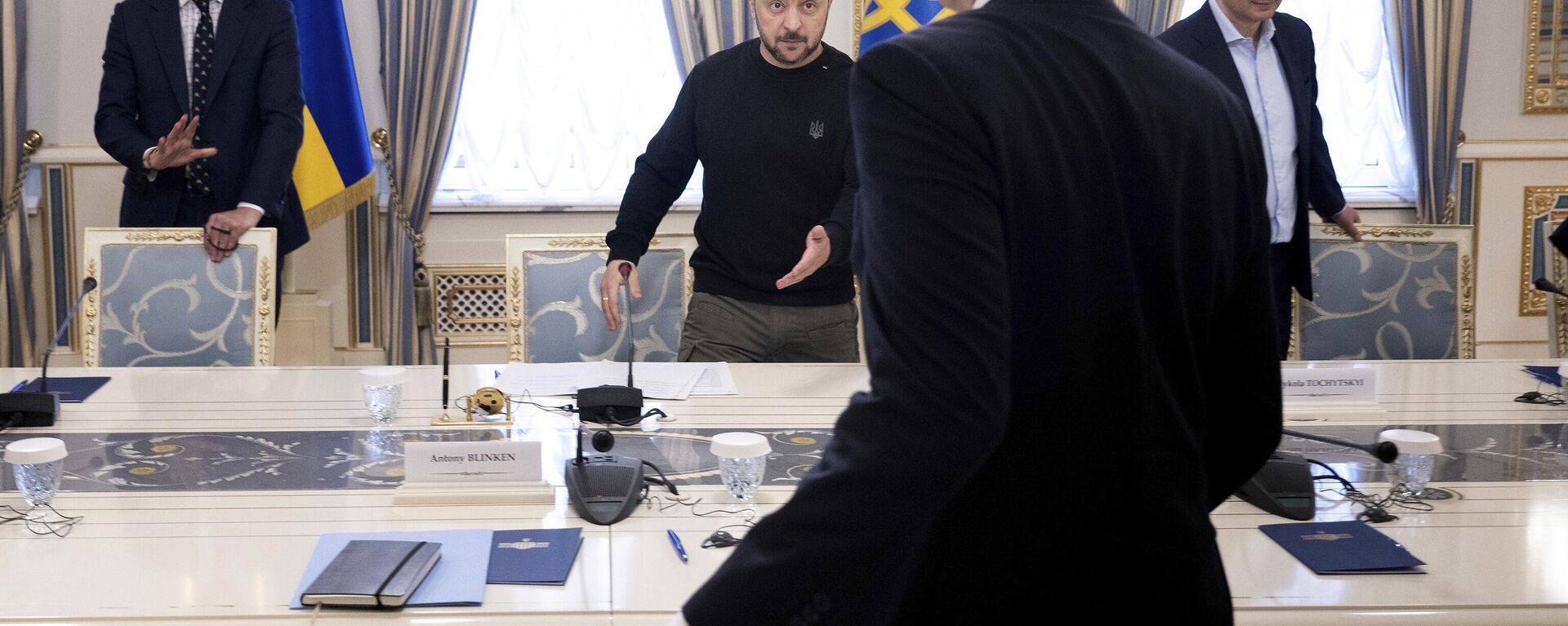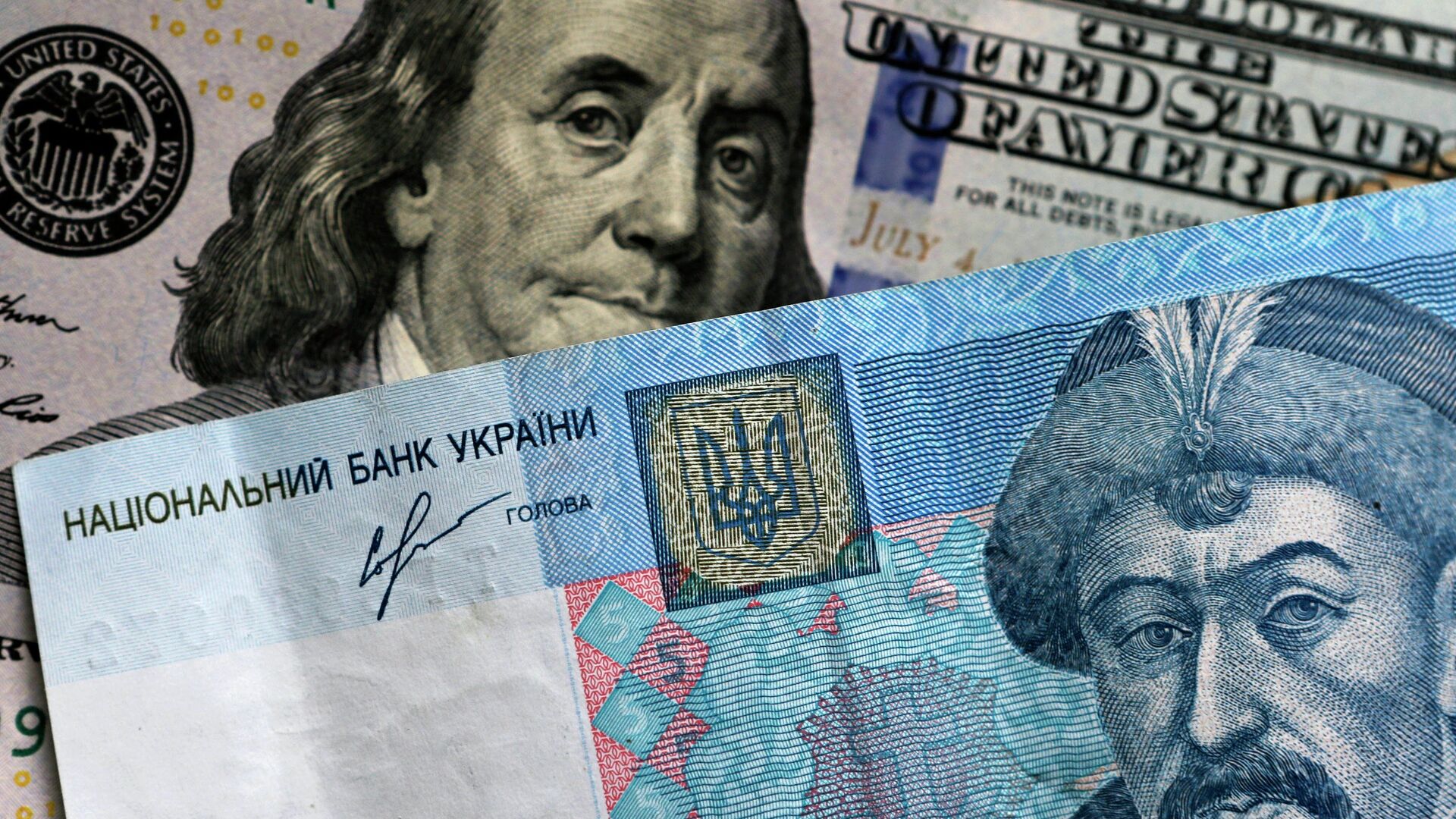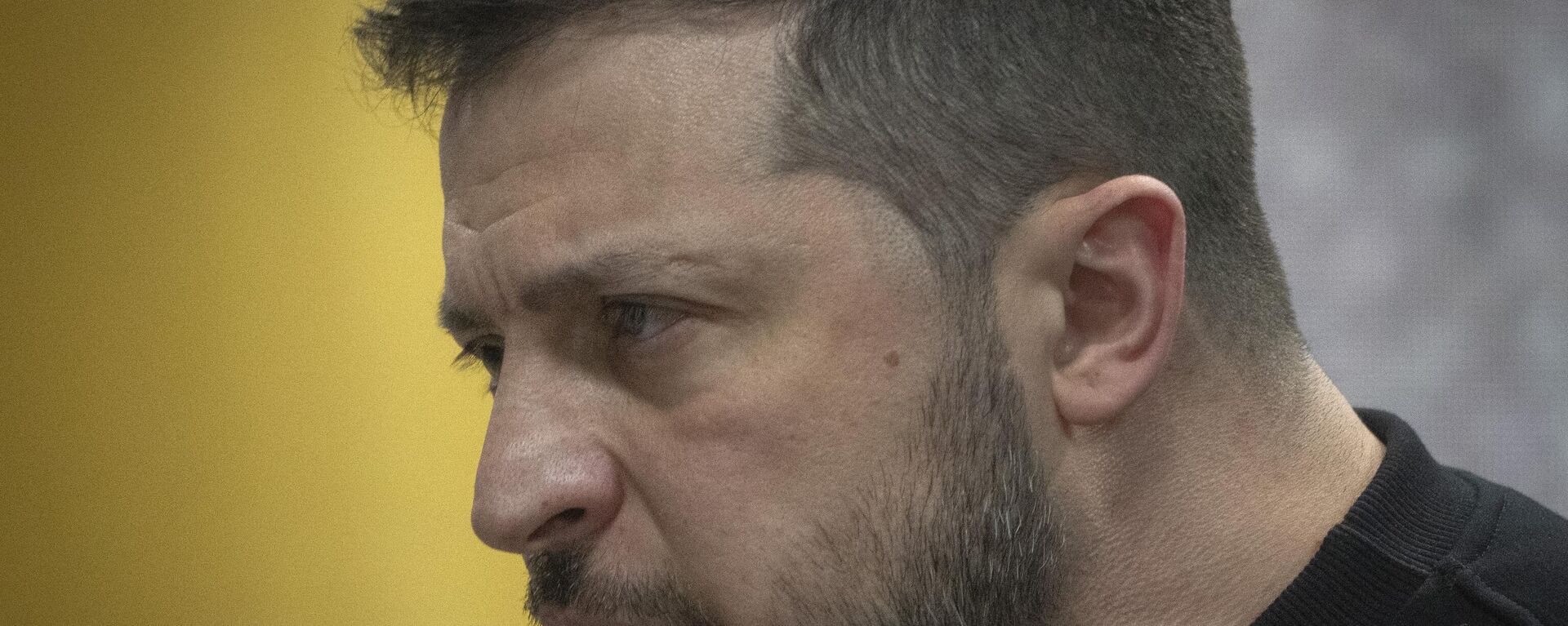https://sputnikglobe.com/20240904/ukraines-imf-paymasters-demand-currency-devaluation-toughened-tax-regime-as-kiev-drowns-in-debt-1120018809.html
Ukraine’s IMF Paymasters Demand Currency Devaluation, Toughened Tax Regime as Kiev Drowns in Debt
Ukraine’s IMF Paymasters Demand Currency Devaluation, Toughened Tax Regime as Kiev Drowns in Debt
Sputnik International
Ukraine’s economic crisis is showing early signs of spiraling out of control, with the cabinet of ministers ordering a partial halt to the servicing of the country’s Eurobond obligations last week, and Kiev becoming hopelessly reliant on Western economic and military aid to keep the economy afloat and the conflict with Russia churning.
2024-09-04T19:11+0000
2024-09-04T19:11+0000
2024-09-04T19:12+0000
economy
imf
donald trump
elon musk
business
ukraine
russia
nato
european union (eu)
international monetary fund
https://cdn1.img.sputnikglobe.com/img/102244/22/1022442229_0:215:2878:1834_1920x0_80_0_0_86037dea864a28a349ce851573bf628d.jpg
Representatives from the International Monetary Fund began a week-long visit to Kiev on Wednesday to demand a series of draconian economic reforms, including the further devaluation of Ukraine’s embattled currency – the hryvnia, a cut in interest rates, more power for the tax man and other measures aimed at at least partially digging the country out of its massive budget deficit, which ballooned to some $38 billion, or 20%+ of GDP, in 2024.Informed sources told Bloomberg that Kiev could be enticed to approve the difficult and unpopular reforms by unlocking $1.1 billion in IMF funding from a $15.6 billion loan program, to be dispersed if Ukraine hits “program targets and has sufficient funds and policies lined up to meet its financing needs.”The sources said Ukraine’s National Bank is hesitant about devaluating the hryvnia any further, with the currency already plummeting nearly 40 percent against the dollar since late 2021, and over 10 percent since late 2023. The bank reportedly fears that a further drop in the hryvnia’s value could threaten price stability, and, together with higher VAT taxes (already above 20%), prove highly unpopular among the population.Western countries have provided Ukraine over $120 billion in economic assistance, plus close to $118 billion in military support, over the past two-and-a-half years, but the country has nevertheless sunk into severe debt, a widening budget deficit and an increasing inability to pay off its obligations.Hit by the loss of the incomes and productive power of hundreds of thousands of working-age men drafted to fight Russia, the loss of economic assets and production capacity n in its former eastern territories, and the siphoning off of state assets by corrupt actors, Ukraine relies almost entirely on foreign assistance to prevent the country’s total economic collapse.Overdependence on the West has put the Kiev regime in economic jeopardy, with Germany – until now the second largest national economic and military donor to Ukraine after the United States, announcing recently that it may end bilateral support for Ukraine after 2025. A similar battle is reportedly taking place in Washington, with former president Donald Trump threatening to cut aid to Kiev unless it enters peace talks with Russia, while neocons from his inner circle have tried to hijack his Ukraine policy by promising Kiev a $500 billion loan and the possibility of NATO membership. In an interview with Elon Musk last month, Trump slammed Joe ‘Low IQ’ Biden for promising Ukraine entry into NATO, assuring that the Ukraine conflict would have a “zero chance of happening” if he were in office, and that the crisis threatens to spark World War III thanks to the “stupid threats coming from” Biden’s “stupid face.”Ukraine’s rocky relationship with the IMF began immediately after the dissolution of the Soviet Union, when Kiev (which unlike Russia began with a clean slate of virtually zero debt in 1992), nevertheless started to get hooked on large-scale loans, which came with conditions calling for a series of shock therapy economic reforms which led the republic’s economy to ruin.In December 2013, citing in part the “extremely harsh conditions” of IMF lending, Ukraine moved to reject an Association Agreement with the European Union in favor of the Eurasian Economic Union with Russia. Two months later, the Ukrainian government was ousted in a violent coup, and Kiev’s dependence on IMF loans only grew, with the new government implementing a series of tough reforms, including a multifold increase in utility prices which left millions of Ukrainians, especially pensioners and residents of rural areas unable to pay their utility bills and afford food and medicine at the same time.
https://sputnikglobe.com/20240904/zelenskys-govt-reshuffle-reflects-wests-behind-the-scenes-power-tussle-over-ukraine-1120013559.html
https://sputnikglobe.com/20240807/zelenskys-ukraine-hits-debt-peak-as-it-fails-to-cover-expenses-1119667484.html
https://sputnikglobe.com/20240702/ukraine-de-facto-in-default-due-to-commercial-debt-of-20bln---lawmaker-1119220757.html
ukraine
russia
Sputnik International
feedback@sputniknews.com
+74956456601
MIA „Rossiya Segodnya“
2024
News
en_EN
Sputnik International
feedback@sputniknews.com
+74956456601
MIA „Rossiya Segodnya“
Sputnik International
feedback@sputniknews.com
+74956456601
MIA „Rossiya Segodnya“
what does imf want from ukraine, is ukraine indebted to the imf, what reforms does imf want ukraine to take
what does imf want from ukraine, is ukraine indebted to the imf, what reforms does imf want ukraine to take
Ukraine’s IMF Paymasters Demand Currency Devaluation, Toughened Tax Regime as Kiev Drowns in Debt
19:11 GMT 04.09.2024 (Updated: 19:12 GMT 04.09.2024) Ukraine’s economic crisis is showing early signs of spiraling out of control, with the cabinet of ministers ordering a partial halt to the servicing of the country’s Eurobond obligations last week, and Kiev becoming hopelessly reliant on Western economic and military aid to keep the economy afloat and the conflict with Russia churning.
Representatives from the International Monetary Fund began a week-long visit to Kiev on Wednesday to demand a series of draconian economic reforms, including the further devaluation of Ukraine’s embattled currency – the hryvnia, a cut in interest rates, more power for the tax man and other measures aimed at at least partially digging the country out of its massive budget deficit, which ballooned to some $38 billion, or 20%+ of GDP, in 2024.
Informed sources
told Bloomberg that Kiev could be enticed to approve the difficult and unpopular reforms by unlocking $1.1 billion in IMF funding from a $15.6 billion loan program, to be dispersed if Ukraine hits “program targets and has sufficient funds and policies lined up to meet its financing needs.”
The sources said Ukraine’s National Bank is hesitant about devaluating the hryvnia any further, with the currency already plummeting nearly 40 percent against the dollar since late 2021, and over 10 percent since late 2023. The bank reportedly fears that a further drop in the hryvnia’s value could threaten price stability, and, together with higher VAT taxes (already above 20%), prove highly unpopular among the population.

4 September 2024, 14:13 GMT
Western countries have provided Ukraine over $120 billion in economic assistance, plus close to $118 billion in military support, over the past two-and-a-half years, but the country has nevertheless sunk into severe debt, a widening budget deficit and an increasing
inability to pay off its obligations.
Hit by the loss of the incomes and productive power of hundreds of thousands of working-age men drafted to fight Russia, the loss of economic assets and production capacity n in its former eastern territories, and the siphoning off of state assets by corrupt actors, Ukraine relies almost entirely on foreign assistance to prevent the country’s total economic collapse.
Overdependence on the West has put the Kiev regime in economic jeopardy, with Germany – until now the
second largest national economic and military donor to Ukraine after the United States, announcing recently that it
may end bilateral support for Ukraine after 2025. A similar battle is reportedly taking place in Washington, with former president Donald Trump
threatening to cut aid to Kiev unless it enters peace talks with Russia, while neocons from his inner circle have
tried to hijack his Ukraine policy by promising Kiev a $500 billion loan and the possibility of NATO membership. In an
interview with Elon Musk last month, Trump slammed Joe ‘Low IQ’ Biden for promising Ukraine entry into NATO, assuring that the Ukraine conflict would have a “zero chance of happening” if he were in office, and that the crisis threatens to spark World War III thanks to the “stupid threats coming from” Biden’s “stupid face.”
Ukraine’s rocky relationship with the IMF began immediately after the dissolution of the Soviet Union, when Kiev (which unlike Russia began with a clean slate of virtually
zero debt in 1992), nevertheless started to get hooked on large-scale loans, which came with conditions calling for a series of shock therapy economic reforms which led the republic’s economy to ruin.
In December 2013, citing in part the “extremely harsh conditions” of IMF lending, Ukraine moved to reject an Association Agreement with the European Union in favor of the Eurasian Economic Union with Russia. Two months later, the Ukrainian government was ousted in a violent coup, and Kiev’s dependence on IMF loans only grew, with the new government implementing a series of
tough reforms, including a multifold increase in utility prices which left millions of Ukrainians, especially pensioners and residents of rural areas
unable to pay their utility bills and afford food and medicine at the same time.





